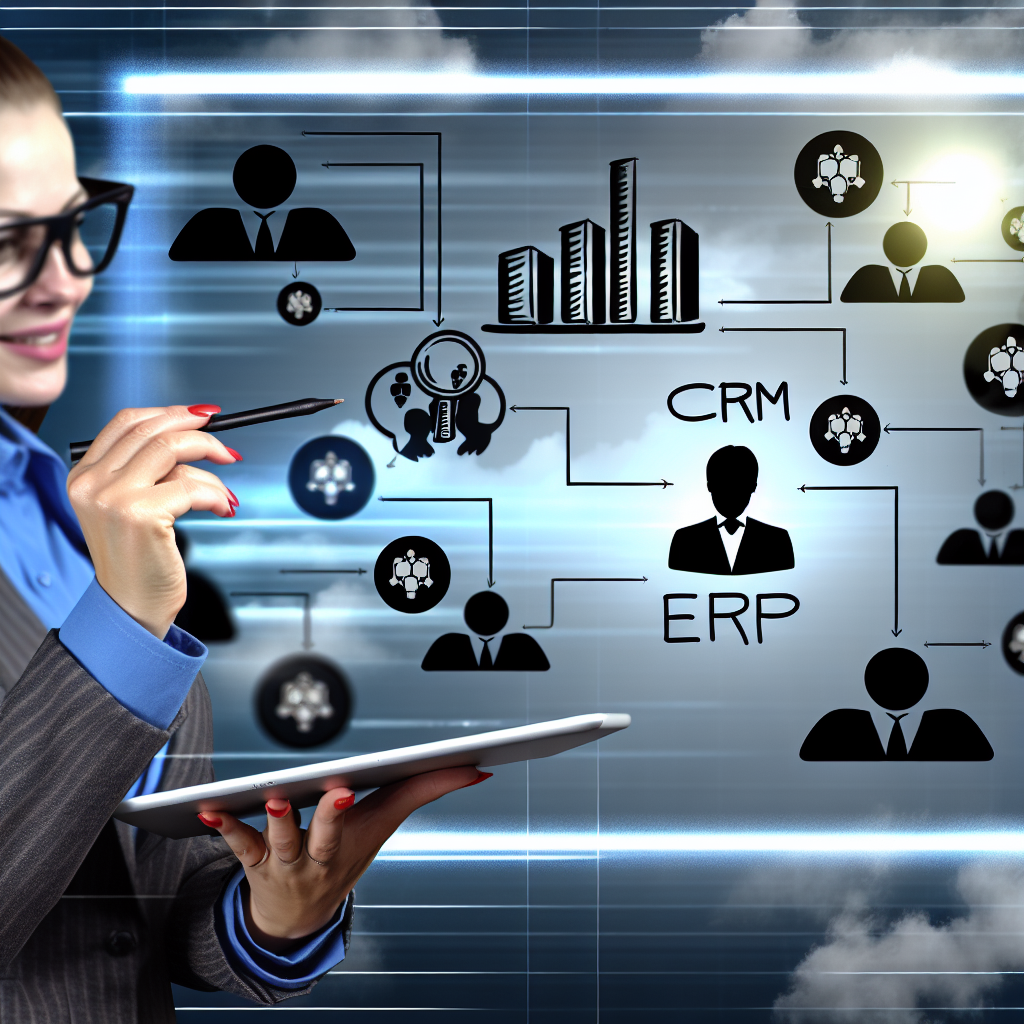
In today’s fast-paced business landscape, the differentiation between software systems can sometimes blur. For Human Resource professionals, understanding how systems like CRM (Customer Relationship Management) and ERP (Enterprise Resource Planning) function together is essential. This article offers a comprehensive look at these systems, their integration, and the benefits it brings to HR and beyond. By diving into the nuances of CRM and ERP, HR leaders can optimise their processes, improve customer interactions, and boost operational efficiency.
Understanding CRM and ERP
CRM and ERP are distinct software solutions tailored for various business functions, yet they are intertwined in ways that can significantly impact a company’s performance.
What is CRM?
CRM software is primarily focused on managing a company’s relationships with current and potential customers. It facilitates communication and tracking across sales and marketing efforts, ensuring that no lead or customer interaction goes unnoticed. Here are key functionalities that a CRM system typically encompasses:
- Sales Management: Tracks leads, opportunities, and performance metrics to aid sales teams.
- Marketing Automation: Automates marketing campaigns and manages communication with customers.
- Customer Service: Provides support and problem resolution, fostering customer loyalty.
- Data Analysis: Evaluates customer data to refine sales strategies and improve satisfaction.
What is ERP?
ERP, on the other hand, serves as a comprehensive solution that addresses a company’s back-office operations. This system integrates various departments, thereby ensuring smooth communication and resource management. The functionalities of an ERP system include:
- Supply Chain Management: Manages procurement, inventory levels, and logistics.
- Financial Management: Streamlines financial transactions, accounts payable and receivable, and budgeting.
- Human Resource Management: Manages HR operations, payroll, benefits, and employee records.
- Operations Management: Coordinates business operations across different departments.
The Importance of Integrating CRM and ERP
The integration of CRM and ERP systems is paramount for businesses. This unification not only streamlines processes but also offers a single platform for managing customer interactions alongside operational data. Such integration aids in:
- Facilitating better data accuracy
- Enhancing customer satisfaction through improved understanding of customer needs
- Reducing data silos and operational friction
Current Trends Affecting CRM and ERP
The evolution of technology influences how CRM and ERP systems are implemented. Here are some current trends your HR department might consider:
1. Cloud-Based Solutions
Cloud computing has revolutionised how organisations deploy CRM and ERP systems. These platforms now offer flexibility and scalability, allowing businesses to access their data from virtually any location. This shift enhances operational efficiency and enables remote teams to function seamlessly.
2. AI and Machine Learning Integration
Artificial Intelligence (AI) and Machine Learning (ML) technologies are making waves in CRM and ERP. AI can automate repetitive processes, improve predictive analytics, and enhance customer service via chatbots and tailored marketing campaigns. This not only saves time but also empowers HR professionals to focus on strategic initiatives.
3. Mobile Integration
With the growing demands for mobility, businesses are implementing mobile-friendly solutions. This trend empowers employees to manage CRM and ERP tasks on-the-go, enhancing productivity and reducing operational delays.
Benefits of CRM and ERP Integration for HR
From an HR perspective, integrating CRM and ERP systems can provide numerous advantages:
- Streamlined Processes: Consolidating customer and operational data leads to an efficient workflow, allowing HR departments to operate with a clear view of organisational needs.
- Improved Data Accuracy: With integrated systems, the risk of data discrepancies decreases significantly. Accurate data is critical for informed decision-making.
- Enhanced Customer Satisfaction: Understanding customer preferences and interactions allows HR teams to provide better service, aligning employee actions with customer expectations.
- Increased Mobility: Integrated systems enable access to crucial data from anywhere, improving responsiveness and agility.
- Reduced Training and IT Costs: Operating from a single system minimises the need for multiple training programmes, leading to cost savings and improved efficiency.
Challenges in CRM and ERP Integration
Despite the many advantages, integrating CRM and ERP systems is not without challenges. HR professionals must be aware of potential obstacles, which include:
- System Compatibility: Ensuring that both systems can communicate effectively is often a key concern.
- Data Duplication: Careful management is necessary to prevent the recurring issue of data entries being duplicated across platforms.
- Data Format Disparities: Integrating systems with differing data formats can lead to complexities in syncing information.
- Legacy System Integration: For some organisations, merging older systems with newer technologies poses significant hurdles.
Overcoming these challenges typically requires thoughtful planning, leveraging integration platforms or middleware, and at times, custom solutions to ensure an effective data flow and functionality between systems.
Conclusion
In summary, both CRM and ERP systems present unique benefits for modern businesses, particularly in the realm of human resources. Understanding each system’s function and the value of integrating them is essential for streamlining processes and enhancing customer and employee satisfaction. The ongoing trends, including cloud-based solutions and AI integration, can further enhance the effectiveness of these systems. While there are challenges to consider, the benefits of integration far outweigh potential pitfalls. HR professionals who embrace these technologies will find themselves significantly better positioned to meet the demands of both their employees and customers, thereby fostering a more efficient workplace.
For further insights on CRM and ERP integration, refer to the following sources:
- What Is CRM And ERP And How It Can Be Beneficial For Businesses
- Simplify Business Processes: Seamless CRM and ERP Integration
- What is CRM and ERP Integration?
- CRM and ERP Integration and What Are Its Benefits?
Vadim Kouznetsov is a distinguished entrepreneur and the visionary founder and CEO of JobXDubai.com, the UAE’s rapidly expanding job board. Renowned for his expertise in bridging the gap between job seekers and employment opportunities, Vadim has become a leading authority in the recruitment and job market of Dubai.
